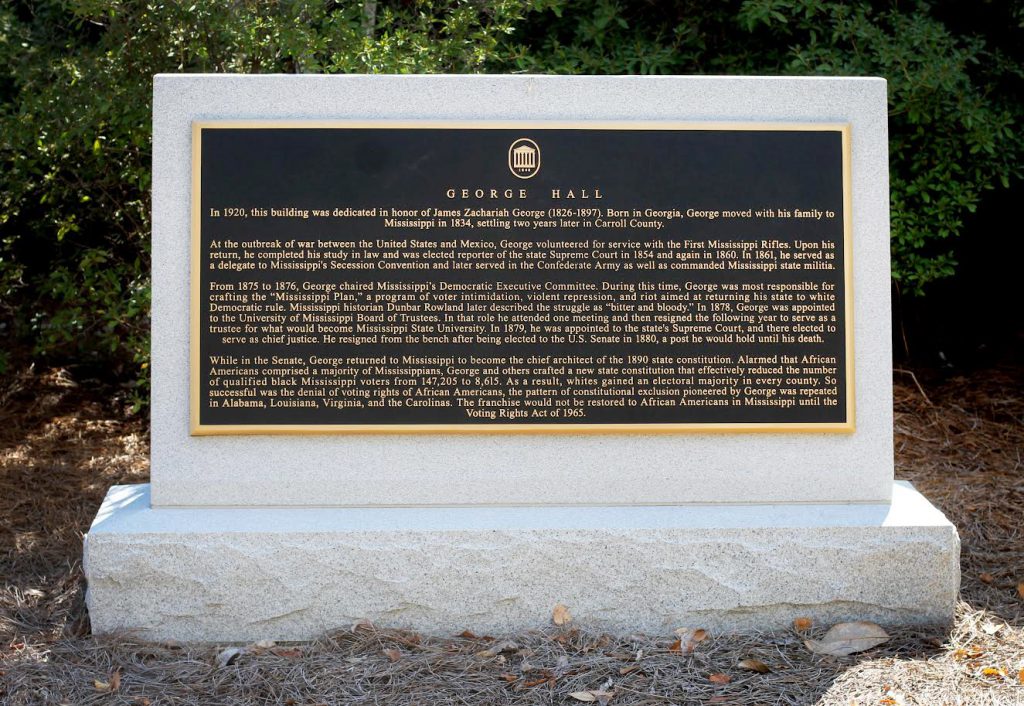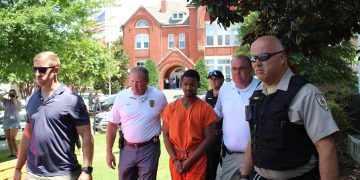Sandwiched between paragraphs outlining James Zachariah George’s biography, the George Hall contextualization plaque says, “George was most responsible for crafting the ‘Mississippi Plan,’ a program of voter intimidation, violent repression and riot aimed at returning his state to white Democratic rule.”
The plaque goes on to say this repression was “bitter and bloody,” and that the constitution of 1890, spearheaded by George, “effectively reduced the number of qualified black Mississippi voters from 147,205 to 8,615.”

These facts are true and important. But they are not sufficient.
Taken on its own, keeping people from voting does not seem that brutal. Many of us choose not to vote, despite having the right. George claimed black suffrage was dangerous to black and white Mississippians alike.
This type of revisionist history, making voter suppression seem benevolent, is overwhelming.
“Mississippi History,” a 1930s textbook, gives an account of the 1875 election so outrageous that it would be comical if it weren’t so disturbing.
According to this book, the “native white citizens” wanted to choose a legislature that would represent them, but a “negro militia” kept them from the polls. The Ku Klux Klan was sent out to “permit an honest election.”
In reality, George’s Mississippi Plan was designed to intimidate black voters. White democrats flooded polling places in 1875, threatening and attacking black voters if they persisted in attempting to vote.
“They said they would carry the county or kill every n—er. They would carry it if they had to wade in blood,” said J.L. Edmonds, a black school teacher in Clay County who watched as many of his fellow voters were shot and killed in 1875.
Voter suppression was not a bureaucratic inconvenience; it was a campaign of terror designed to prevent the black population — 55 percent of Mississippi’s population in 1875 — from jeopardizing white domination.
In the state constitution of 1890, George made the voter suppression of 1875 into law. It included many provisions specifically targeting black voters — such as poll taxes, literacy tests and a list of disenfranchising crimes — specifically targeting black voters, but incorporated a grandfather clause to ensure the rights of poor white voters.
This outright suppression carried on well into the 20th century. Gus Courts, co-founder of the Belzoni branch of the NAACP, recalls in Timothy B. Tyson’s 2017 book, “The Blood of Emmett Till,” that he rallied a group to vote in 1955 despite being told “the first Negro who put his foot on the courthouse lawn would be killed.”
When the group arrived at the courthouse, after a series of ludicrous questions, their ballots were rejected. Despite its significant black population, not a single black vote was counted that year in Humphreys County, and the 22 black people registered to vote there were regularly threatened and attacked. Later that year, Courts fled the state, calling himself a “refugee of Mississippi terror.”
After the Voting Rights Act of 1965, people across the country worked to overturn the system that men like George put in place 75 years before. The poll tax and literacy tests were prohibited, and security forces were sent to polling sites to allow the black population to vote.
However, even now, voter suppression and intimidation keep Mississippi elections from being truly representative.
Charles Taylor, a Jackson-based community organizer and political data manager, confirmed this idea that the state uses tactics to limit voting among low-income and black populations.
Disenfranchising crimes, Taylor said, is a voter suppression tactic tracing back to emancipation. While there are only 22 disenfranchising crimes in Mississippi, this list disproportionately targets black communities. This is reminiscent of post-emancipation vagrancy laws, used to legally subjugate liberated slaves.
To this day, according to Rethink Mississippi, while 37 percent of the state’s population is black, 61.4 percent of prisoners in Mississippi are black. Being in prison is not considered a valid reason to vote absentee in Mississippi.
Mississippi requires a photo ID to vote, another powerful modern tactic to keep people away from the polls. Black people are statistically less likely than white people to have a valid driver’s license, and while the state offers voter ID cards, obtaining one requires a birth certificate, which itself requires a photo ID.
George’s actions continue to influence our elections. The dehumanizing violence he endorsed is grandfathered into our culture and policy. The longevity of this legacy is visible in his namesake building on our campus.
“Ole Miss has been a manifestation of this state for a very long time,” Taylor said. “Just as subtle as the buildings are, in terms of the students going into the buildings, and they don’t know the origins of it. I think sometimes the state can be just as subtle with its oppression and its racism.”
One of the most powerful things we can do to combat this system — in the days of Gus Courts and now — is vote.


























